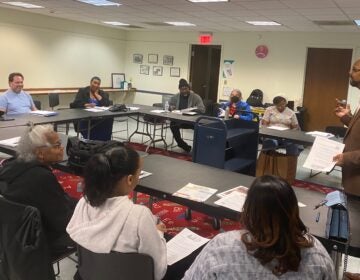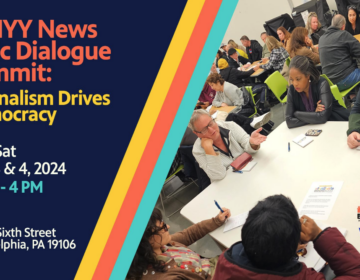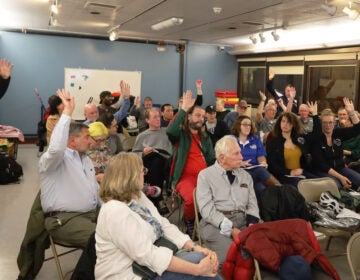Following Alabama’s controversial legislation on IVF procedures, Bridging Blocks hosts conversation on women’s reproductive rights
WHYY News hosted a conversation at the Chestnut Hill Library in Philadelphia to discuss the ruling in Alabama and the June 2022 overturning of Roe v. Wade.
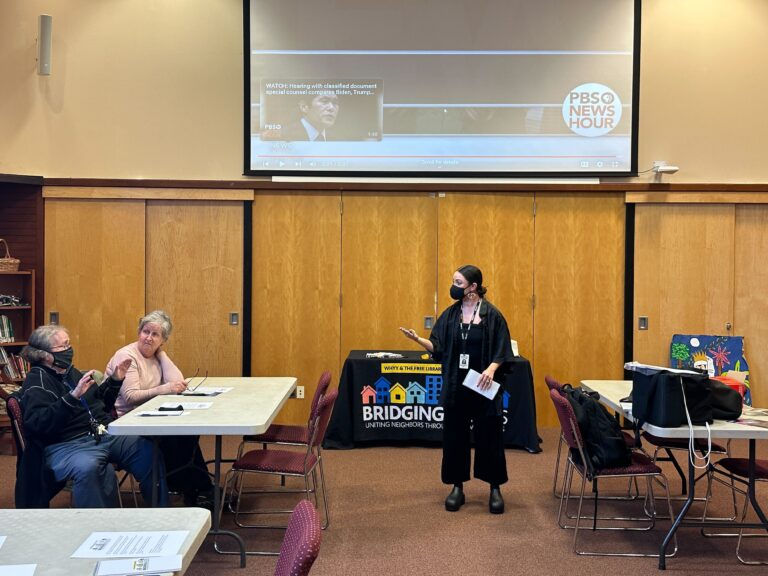
WHYY News' Vicky Diaz-Camacho moderating a Bridging Blocks conversation about women's reproductive rights. (Jochebed Peace/WHYY)
From Philly and the Pa. suburbs to South Jersey and Delaware, what would you like WHYY News to cover? Let us know!
“This is really about control. It’s about who gets to decide whether, when and with whom somebody gets to have a child or not,” said Julie F. Kay, a human rights attorney and guest on “PBS NewsHour,” which tackled the topic of fetal personhood following the Alabama Supreme Court’s controversial ruling that embryos frozen during the process of in vitro fertilization (IVF) be considered live children.
In seeking to understand the impact that this ruling had in the Republican state, a recent Bridging Blocks conversation considered this question: Who has the right to choose women’s reproductive rights?
Half a dozen people met at the Chestnut Hill Library in Philadelphia to discuss their thoughts on the ruling in Alabama and the June 2022 overturning of Roe v. Wade.
The conversation was moderated by both Eric Marsh, Sr., WHYY News’ manager of community and engagement, and Vicky Diaz-Camacho, a multi-platform producer at the WHYY.
Though they were small in number, the discussion’s participants were mighty in their opinions.
“In my experience as a physician, IVF is a resource [for] people who want children,” began Dr. Mary Anne Delaney, a professor of psychiatry at Drexel University College of Medicine. “I’ll never understand why you’ll keep people from having access to that resource if you want people to have children.”
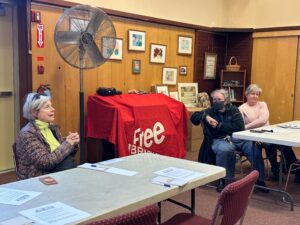
The Alabama Supreme Court’s ruling, which apparently stemmed from a desire to encourage the birth of human life, led to the opposite. The University of Alabama Division of Reproductive Endocrinology and Infertility halted their IVF treatments; another clinic followed suit, fearing potential criminal liability.
Why this, though apparently accidental, pushback against the creation of human life?
“When you do a procedure with IVF, you’re fertilizing more than one egg,” responded Peter Andruss, a grandfather with several granddaughters. “And you can only use one fertilized egg.”
This, Andruss believes, is where the conversation on fetal personhood begins in Alabama — especially following one couple’s wrongful death lawsuit against their IVF clinic after the accidental destruction of their fertilized embryos by an employee of the clinic.
“It’s a loss, in terms of what that couple is feeling. And they want justice,” explained Marsh, Sr. “This legislation comes about as a result of that loss, but [it’s] been flipped around on its head, and folks from more extreme sides of the conversation are trying to leverage this to mean one thing versus the other. The squeaky wheel gets the oil.”
Republican governors opposed the new legislation. Former President Donald Trump professed his support for the use of IVF procedures. Under this pressure, the Alabama State Legislature buckled. Ultimately, a new bill was passed to protect those receiving or providing IVF services.
“They backed themselves into a corner, ethically, philosophically, morally,” said Kate Maus, a retired social worker.
After earning her Master of Social Service from Bryn Mawr College in 1975, Maus served as a social worker in Philadelphia, specializing in maternal and child health and visiting homes in “every section of the city.”
“I did a lot of abortion counseling,” Maus said of her early career. “I saw 12-year-olds, people who were pregnant because of rape and incest.”
In her eyes, Pennsylvania is now “kind of a haven” when it comes to women’s reproductive rights.
“Back then, in the mid-70s, we sent people to New York City, because that’s where you could go,” said Maus. “It was illegal to perform an unlawful abortion [in Pennsylvania]. It’s different now.”
Overall, participants agreed that women should have the right to choose and were dismayed at the nationwide legislature that allowed the repeal of what they believed to be a right.
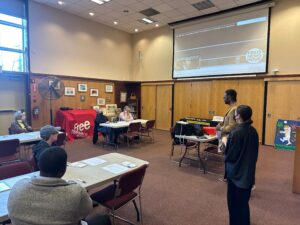
“I just feel like there’s a bunch of old white men making this decision!” said Meritt Andruss, who became a member of the Raging Grannies organization after the overturn of Roe v. Wade, a decision for which she marched in her youth. After having two daughters, Andruss was “thrilled” that she, and women like her, had achieved their goal.
In a post-Roe v. Wade world, however, “[The legislators] have no knowledge or understanding. And now, I have several granddaughters; they have lost what I had, what my children had. It’s a huge loss,” Andruss said.
Participants also alluded to the impact that the overturning of Roe v. Wade had in states banning abortions caused by rape or incest. One participant highlighted that, in Texas, alleged rapists can report survivors of the assault for deciding to abort a pregnancy caused by the rape.
Two of Meritt Andruss’s family members are survivors of rape.
Derrick Ford recalled learning, in seventh grade, that a “really good friend” of his had been raped by her uncle.
“We were kids trying to put together little dollars, five dollars to help her [get an abortion],” Ford said. “So, when you talk about the right to live, that child wouldn’t have been in the best environment growing up, because [her mother] wasn’t even in the best environment growing up.”
One mother in Texas carried her twins to full-term, though she was told the twins would not survive outside the womb. Their fetal heart rates could still be detected; Texas law prevents the termination of pregnancies with a detectable fetal heart rate. Some doctors are concerned that such pregnancies still risk the mother’s health.
“The poor doctors — they don’t know what to do. They have to decide, ‘Should I risk losing my license or losing my patient?’ What kind of a choice is that?” asked Meritt Andruss.
So, what do men have to do with women’s reproductive rights?
As Peter Andruss succinctly put it, “It takes two to tango.”
“It’s our responsibility, too,” said Andruss. “I am raging with all that’s going on. I just want to show support, and do something, besides coming here.”
“It’s not [a man’s] damn business,” said Ford, repeating the words of a friend’s mother. “You should be a confidant; you should be a supporter of whatever the woman in your life would like to do.”
Some participants were bemused by the government’s involvement in what they saw to be a private decision.
“If I choose not to have a baby, I’m not telling anyone else what to do about it,” posed Dr. Delaney. “Why do we have to have a law about it? I just don’t get it.”
One participant did acknowledge that it is difficult to challenge deep-rooted, and typically religious, arguments that abortion is the same as murder.
“If we had people here representing the [pro-life] point of view, there would be people who would be saying, ‘If you believe that life begins in conception, we don’t allow you to murder another person, we can’t allow you to [have an abortion]’,” said Maus. “When you hold a belief like that…how do you argue with belief?”
Participants agreed that there was a gap in the application of religious arguments to preserve unborn life and the efforts made to preserve life once it leaves the womb.
“This is more [about] the right to birth, because it’s not about the right to life,” said Dr. Delaney. “Really, what are we doing to make sure that kids grow up with a roof over their heads, enough food to eat, schools to go to? I wish we were as concerned about that as we were about if they were going to be born right or not. It’s just maddening to me.”
Dr. Delaney also recognized that not all partners stay with mothers to raise their children. Maus argues that this presents an opportunity for others to fill in the gap.
“If you cause decisions to be made that have a huge impact on your neighbors, then you have a responsibility,” said Maus. “If you’re opposed to abortion, and you’re neighbors of women who wanted to have an abortion but couldn’t, that’s your baby.”
Participants also concurred that there are not enough conversations about sex education happening in schools in the U.S.
“I think there’s got to be a lot of education that gets done about contraception, about what’s involved in raising kids,” said Dr. Delaney. “Most people who do the tango [aren’t] thinking, ‘Do I have everything ready?’ They’re just thinking about how to do the tango.”
So, what is the way forward? Participants expressed a desire to learn how to have difficult conversations about women’s reproductive rights without the discourse deteriorating to vitriol.
For now, all conversation participants stressed that the ballot is the only way to achieve their goals for women’s reproductive rights. Maus recalls the push to amend Pennsylvania’s constitution to “forbid” abortion before the midterm election in 2022.
“We were able to flip the House, so Democrats now have a majority. [The bill wasn’t passed by] one vote. One vote,” said Maus. “If there’s any question about the link between who gets elected, who controls the House, who controls the agenda, and individual rights — there it is.”
The conversation on women’s reproductive rights will continue at the next Bridging Blocks discussion happening March 26 at the Parkway Central Library.

Get daily updates from WHYY News!
WHYY is your source for fact-based, in-depth journalism and information. As a nonprofit organization, we rely on financial support from readers like you. Please give today.


